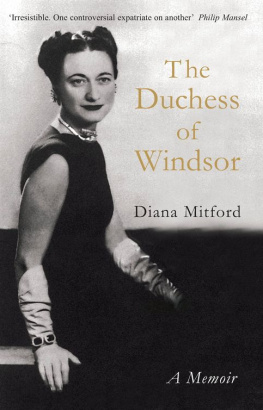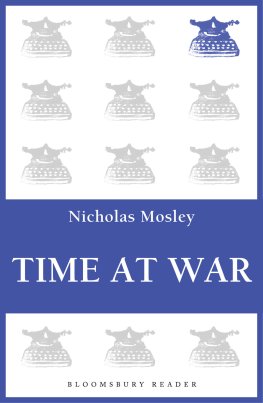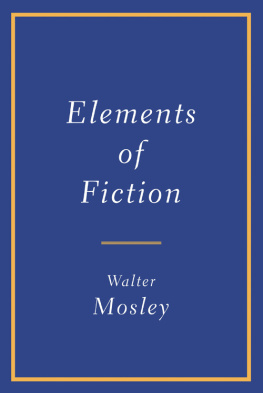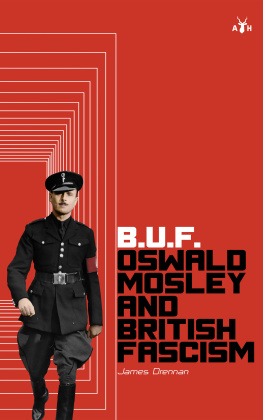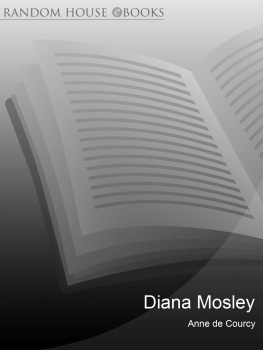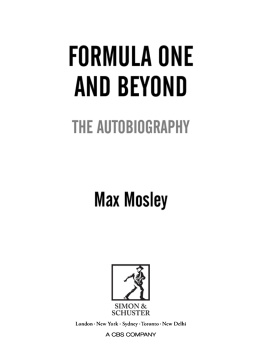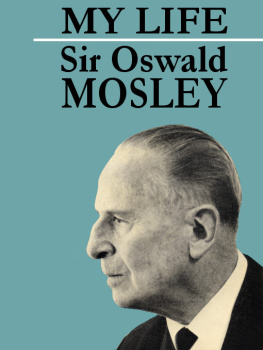I am very grateful to the following, who have given me invaluable help in writing this book: Jane, Lady Abdy; Mrs Herbert Agar; the late Sir Cecil Beaton; Lady (Rex) Benson; Ann-Mari Princess von Bismarck; Mitre Suzanne Blum; Comtesse Ren de Chambrun; Father Jean-Maria Charles-Roux; The Lord Colyton; Grace, Countess of Dudley; Sir Dudley Forwood Bart; Mme Jean Gaudin; Dr Henry Gillespie; Marquis de Givenchy; Mr John Grigg; Mr Horst; Mr James Hudson FRCS; Mrs James Hudson; Mr Geoffrey Keating; Mr Walter Lees; The Lady Elizabeth Longman; Prince Jean-Louis de Lucinge; Miss Rose Mary Macindoe; Mrs McLaughlin; Mme Igor Markevitch; Mrs Metz; M. Herv Mille; Major-General the Viscount Monckton of Brenchley; The Hon. Rosamond Monckton; Sir Berkeley Ormerod; M. Gaston Palewski; Miss Fiona Da Ryn; M. Maurice Schumann; The Countess of Sefton; Miss Monica Sheriffe; Professor Robert Skidelsky; Mr John Utter; Mrs Diana Vreeland; Miss Margaret Willes. My special thanks to Lady Lloyd, who allowed me to quote from an unpublished memoir written shortly before his death by her uncle, Captain the Hon. Bruce Ogilvy, who was equerry to the Prince of Wales for nine years.
I should also like to thank the following for permission to publish extracts from copyright material in their possession Allen & Unwin Ltd for Queen Mary, 1867-1953 by James Pope-Hennessy (1959); W. H. Allen & Co. Ltd for The Woman he Loved by Ralph Martin (1974); Jonathan Cape Ltd for The Slump by John Stevenson and Chris Cook (1977); Cassell & Co. Ltd for A Kings Story: The Memoirs of H.R.H. the Duke of Windsor (1951); Collins & Co. Ltd for Diaries and Letters 1930-9 by Harold Nicolson (1966); Constable & Co. Ltd for Winston Churchill: The Struggle for Survival by Lord Moran (1966); Evans Brothers Ltd for Your Dear Letter: Private Correspondence of Queen Victoria and the Crown Princess of Prussia, 1865-71 edited by Roger Fulford (1971); Eyre & Spottiswoode Ltd for Editorial; The Memoirs of ColinR. Coote (1965); Hamish Hamilton Ltd for Victor Cazalet by Robert Rhodes James (1976); Hart-Davis MacGibbon Ltd for The Light of Common Day by Lady Diana Cooper (1959); Michael Joseph Ltd for The Heart has its Reasons by the Duchess of Windsor (1965); La Pense Universelle for Mon Dieu et mon Roi by Jean-Maria Charles-Roux; Macmillan Publishers Ltd for Life with Lloyd George by A. J. Sylvester (1975); and the Earl of Airlie for Thatched with Gold by Mabell Airlie (1965). Picture acknowledgements where not part of the authors private collection may be found in the earlier edition of the work.
From too much love of living,
From hope and fear set free,
We thank with brief thanksgiving
Whatever Gods may be
That no man lives forever,
That dead men rise up never
That even the weariest river
Winds somewhere safe to seas.
Swinburn
WHEN THIS BOOK was first published, the Duchess of Windsor was still alive, but she never saw the book. Her heart was beating, therefore she was alive, but she was fed artificially and supposed to be unconscious of her surroundings. She had three nurses, doctors, a solicitor; no visitors were allowed. There was a notice in the hall of her house, signed by her doctors, forbidding them. In any case, she would not have known her visitor, or registered that somebody had come to see her. Relations would have been allowed to see her, but she had none. She had in-laws in England who also would have been allowed to see her, but there again they would have seen a body lying in bed beautifully looked after as an English doctor put it.
Nobody knows whether people in this distressing condition can think at all, whether they dream, whether they have nightmares. I heard recently of a case involving a male patient. His daughter said to the doctor how very sad his expression was. The doctor dismissed the idea that he might be sad, saying he was completely unconscious and felt nothing, but the daughter insisted, and the man was finally given an injection. The expression on his face changed at once.
The last time I saw the Duchess she looked absolutely miserable and tragic. Whether anything was done to help her I dont know. In such cases the great need is for family who realise there might be ways of helping. After my last visit, she lived for ten more years. Even ten days would have been too much. She was kept alive until she was ninety. It is a terrible, haunting thought that she may not have been as completely unconscious as the doctors supposed.
Her solicitor, Matre Blum, was a very forceful character and she idolised the Duchess. If on the medical side it is impossible not to feel that, in her isolated conditionwithout a single relation who might intervene to help hershe had almost incredible misfortune, on the legal side she was extremely lucky. Me Blum realised she was in charge of a very important archive. She chased away anyone rash enough to try and get hold of it, or to suppress the truths it contained.
She in her turn had good fortune because the young barrister who joined her chambers in pursuit of a career as an international lawyer was Michael Bloch, who as time went on became an excellent writer. Perceiving this Me Blum gave him the Windsor papers to work on and he produced books, of which the best is The Duke of Windsors War. Tracing the Dukes activities day by day from 1939, and until he sailed from Portugal to the Bahamas of which he had been appointed Governor in 1940, the book answers various calumnies of which the Duke has been the victim in Englands yellow press by describing what actually happened.
Quite simply, the Duke wanted to serve his country in England, but it was made plain to him that the Duchess would not be treated as his wife should have been. He therefore reluctantly accepted the offer of a governorship of the Bahamas, staying there until the end of the War. There appears to have been jealousy of his charm and popularity, not bestowed by fate on other members of his family. If he were sent thousands of miles away, the memory of what he had been would gradually fade. It was quite a clever idea, and as time went on he himself was less anxious to go to Englandhis home was wherever the Duchess might be. Winston Churchill, who as Prime Minister had to give the Duke the order to go to the Bahamas, significantly added the words I did my best.
When he abdicated, the new King had promised that after an interval he could come back from time to time to Fort Belvedere (in Berkshire), the house he loved so much. But this was a gentlemans agreement, there was nothing written down, no legal arrangement. The Duke would never have resorted to the courts, because in his opinion such a move would have injured the monarchy. It was the same with the Duchesss title, lawyers agreed he would have won his case but an action at law was something he declined to contemplate.
It is impossible to exaggerate the loneliness of the Duchess of Windsors last eight years of life. She had one friend, her butler Georges Sangre. He was an exceptional person, not only an excellent butler with a very charming personality but he was truly fond of the Duchess. When she was no longer allowed to see friends, I went to her house to talk to him. I asked him to promise to telephone me and tell me if, for example, one of the nurses was less than kind. I went quite often to see him, he and his wife Oflia must have felt as if they were living in a tomb.

